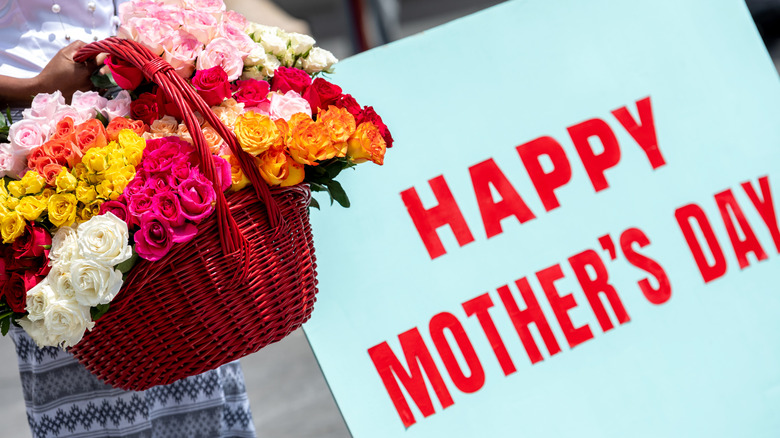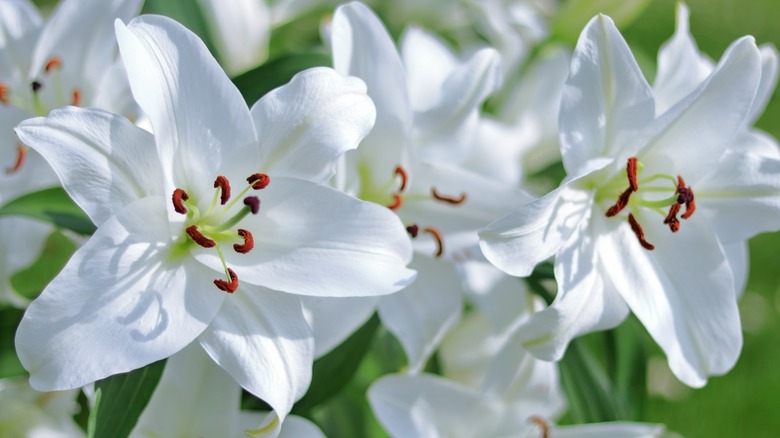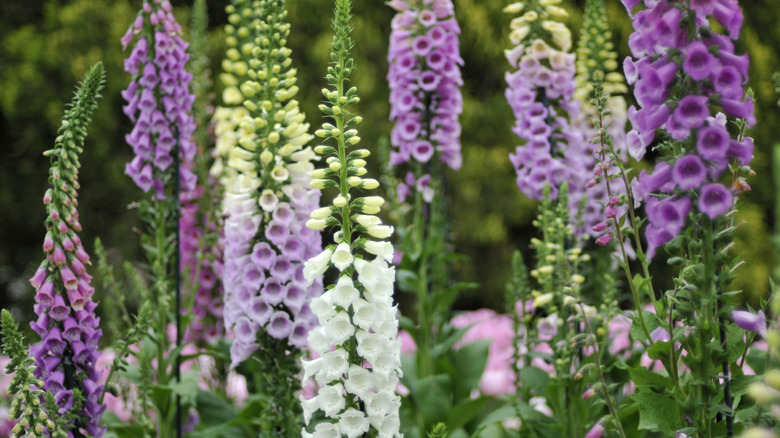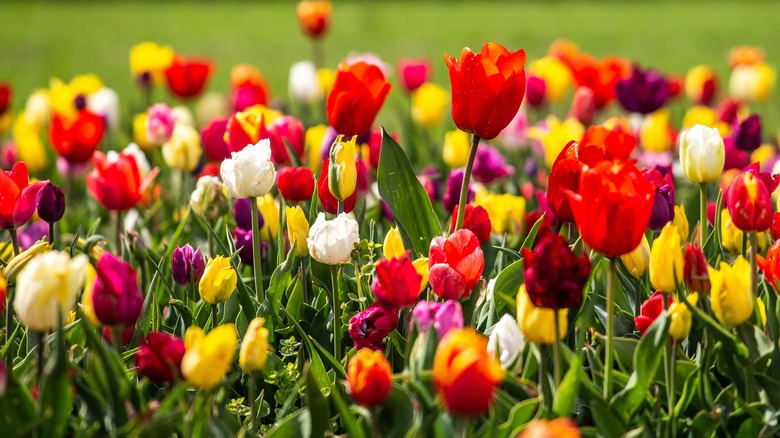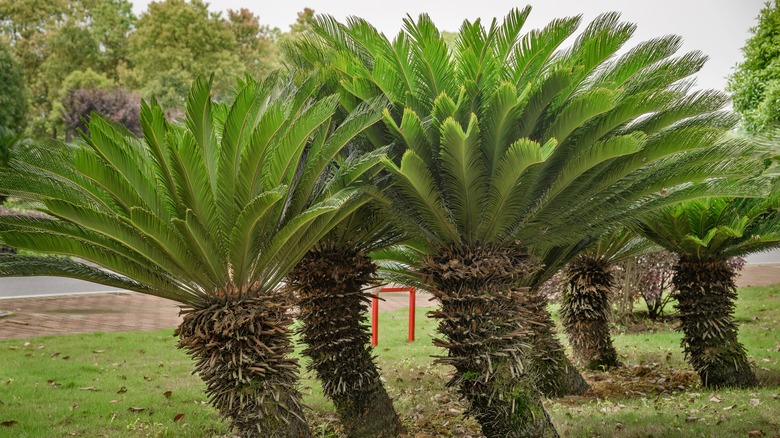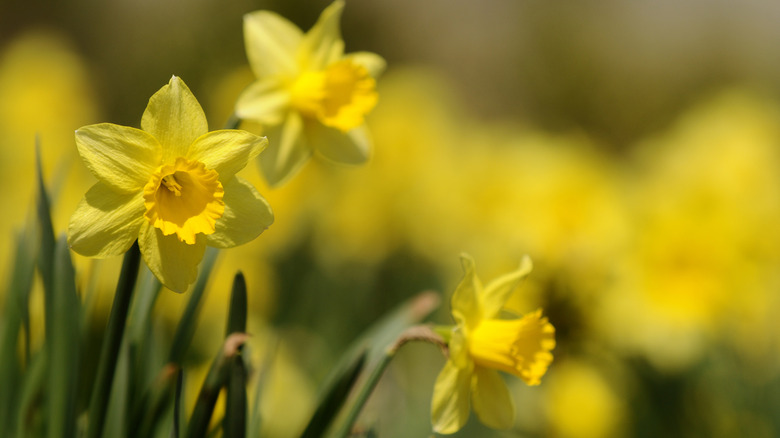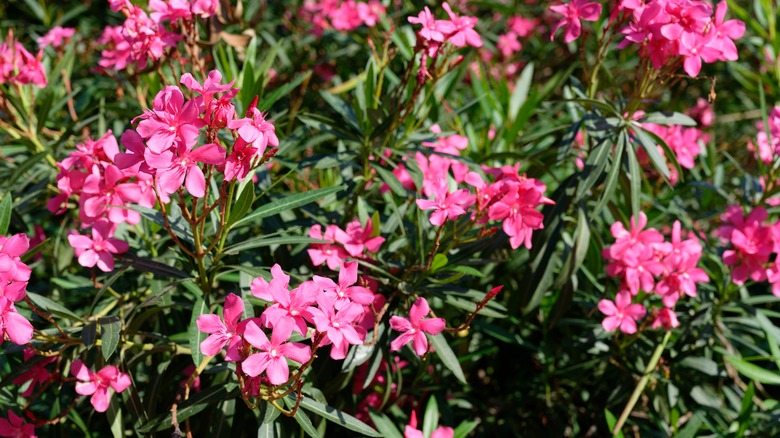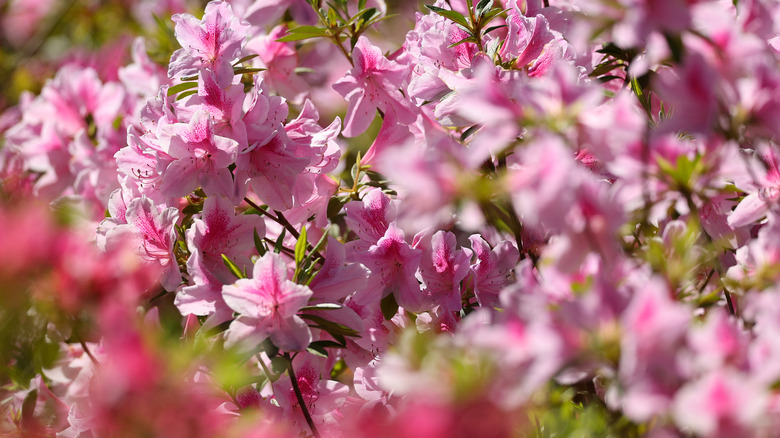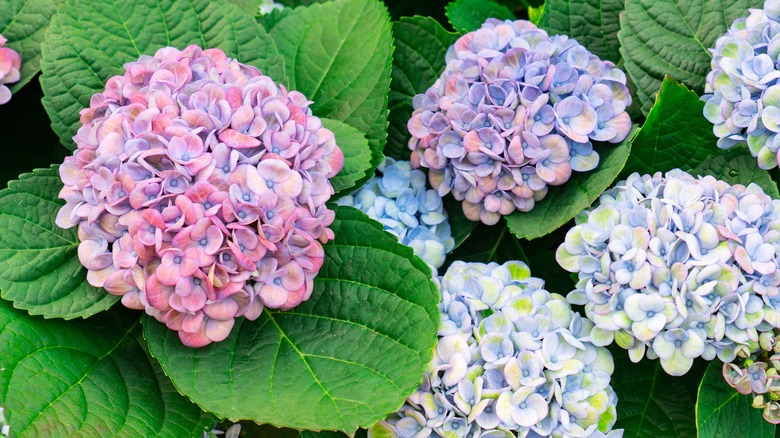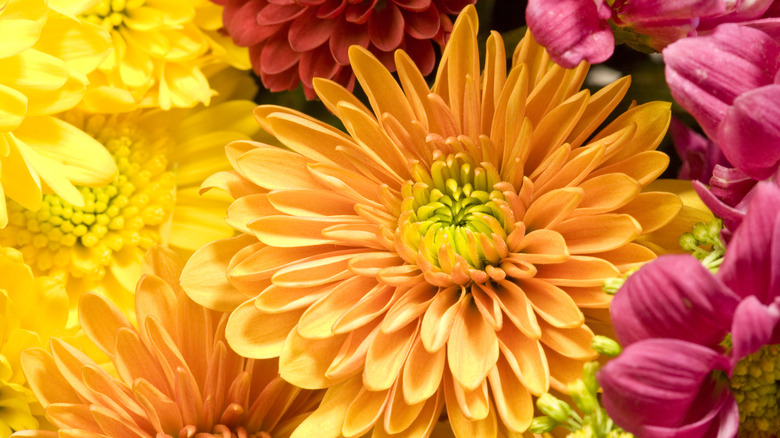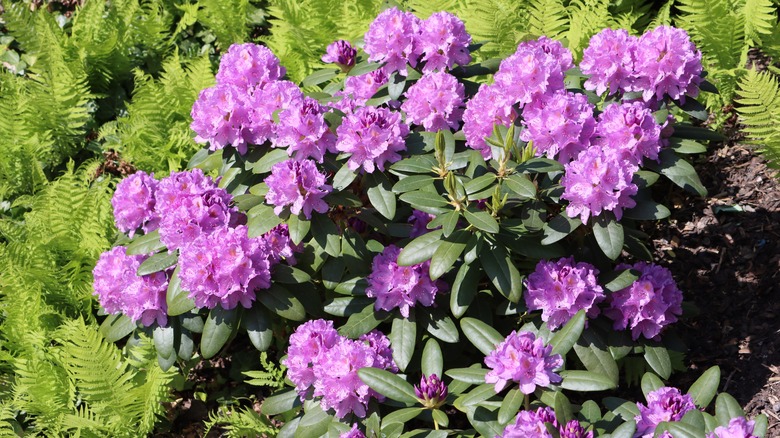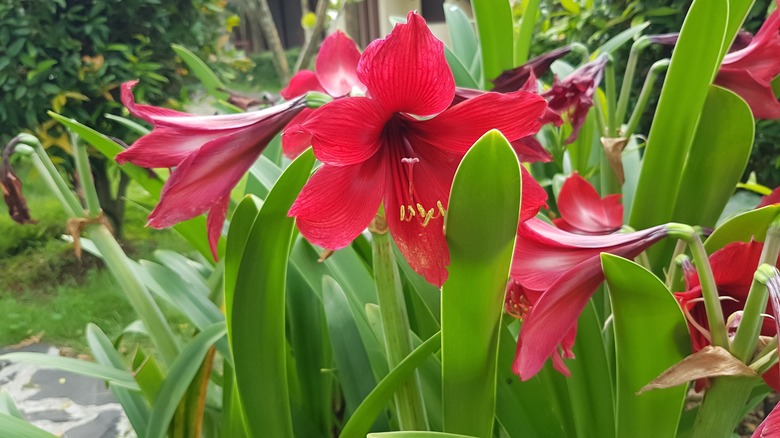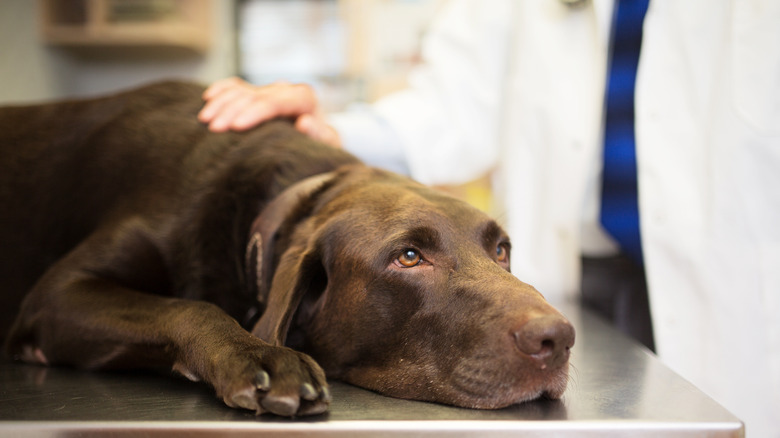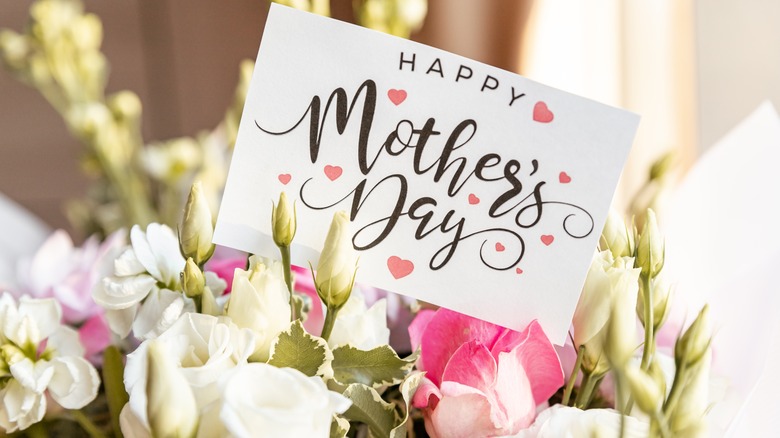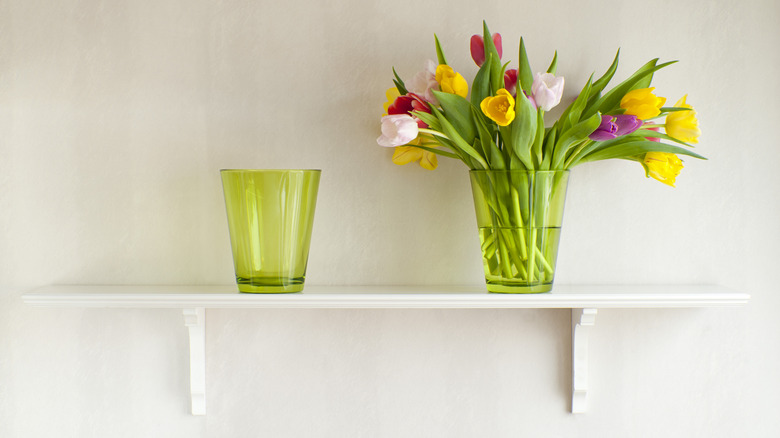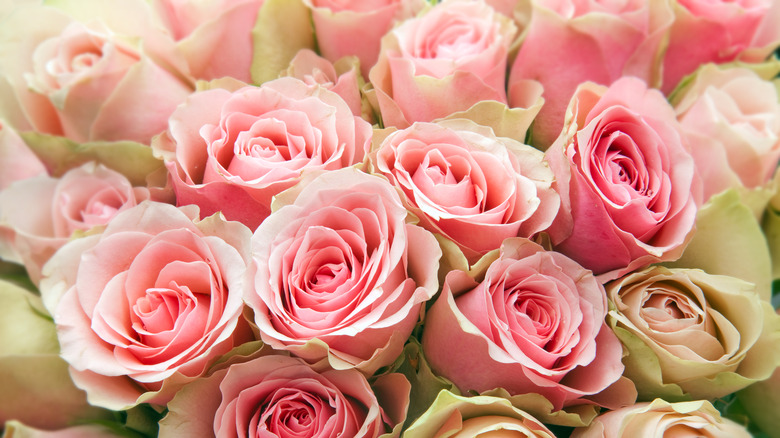Most Toxic Mother's Day Flowers That Your Pet Could Get Into
With Mother's Day around the corner, you are likely shopping for the perfect present for your mom, or other mom-like figures in your life. While the classic option is a nice bouquet of flowers to show your appreciation, you might need to think twice about the kind you buy if she has pets. Some plants and flowers can be toxic to animals, turning Mother's Day into an emergency vet visit. "In my experience in veterinary clinics, we see these kinds of poisonings a few times each season. Educating pet owners about these risks is crucial because it helps prevent emergency visits, which are distressing and often expensive," Dr. Kathryn Dench, MA, VetMB, and Chief Scientific Advisor at Paw Origins told HouseDigest in an exclusive interview. "Recognizing early signs of poisoning can also drastically improve outcomes for affected pets."
We also spoke to Dr. Kristi Crow, on Instagram as DogtorKristi, about the dangers of certain flowers and great alternative options. With this expert advice in mind, these are the most toxic Mother's Day flowers that your pet (and your mom's pet!) could get into — so it's best to avoid them.
Leave lilies alone
Lilies are a great springtime flower, but they are a huge no if you have pets at home. "Lillies are famously toxic to cats, and also a risk to dogs," Dr. Dench said. "They contain compounds like lycorine and other alkaloids that can cause kidney failure, especially in cats. For dogs, eating large amounts can lead to stomach upset and lethargy." It's best not to risk it, even if they are out of reach, as Dr.Crow adds, "If a cat ingests ANY part of a lily, it can be extremely dangerous." This includes all variations of lilies, too. If it has "lily" in the name, best leave it at the store to keep your pets safe.
Foxgloves can harm most pets
Foxgloves are tall, slender plants with spires of tubular flowers. They typically grow in shades of pink, purple, white, or yellow, often with spots or markings on the inner petals. They are gorgeous, but can be toxic to the touch. It's even worse for all involved if they are ingested.
"Foxglove contains cardiac glycosides, which can cause gastrointestinal upset, drooling, vomiting, diarrhea, weakness, heart arrhythmias, and in severe cases, cardiac arrest in pets," Dr. Crow told HouseDigest. Because of this high risk, ask the florist to leave them out of any Mother's Day bouquets you buy. The plant is also toxic to people, so if you have small children around you might want to remove it from your yard as well.
Tulips are best for pet-free houses
Tulips are a much-loved and much-planted springtime flower, but they can really hurt your pets. "The bulbs of tulips contain a compound called tulipalin A and B, which can cause a range of intense toxicity symptoms," Dr. Dench shared. "These include gastrointestinal symptoms, such as stomach upset, drooling, and loss of appetite, as well as nervous system problems like sedation, convulsions, and cardiac abnormalities." So even though these are gorgeous flowers, if your pet eats them, you might regret bringing them home.
Sago palms are a bad idea
Sago palms have stout trunks and glossy, feather-like fronds, adding a touch of tropical elegance to any landscape. Despite their name, they're not true palms but belong to the cycads family. Either way, they are harmful to most pets. "All parts of this plant are poisonous, but the seeds are the most toxic," Dr. Dench said. "It contains cycasin, which can cause liver failure and potentially fatal gastrointestinal upset." Dr. Crow adds to the list of symptoms, citing "vomiting, diarrhea, lethargy, and in severe cases, death."
Daffodils are bright, but still deadly
Daffodils boast trumpet-shaped blossoms atop slender, green stems. Their vibrant yellow petals, sometimes tinged with orange or white, radiate warmth and cheerfulness — making them perfect for a Mother's Day bouquet, unless you have pets at home. This is because "Daffodil bulbs contain alkaloids that can cause gastrointestinal upset, drooling, vomiting, diarrhea, and in severe cases, convulsions and cardiac arrhythmias," Dr. Crow said. Although they are a fun springtime flower, it's not worth the risk of your pet ingesting their toxic elements.
Oleander is a poor choice
Oleanders are evergreen shrubs with lance-shaped leaves. They flaunt clusters of showy, funnel-shaped flowers. Their blooms, in shades of pink, red, white, or yellow, adorn the glossy foliage, creating a striking contrast that some might think is a great idea for a floral arrangement. Despite their allure, caution is warranted, as all parts of the plant contain toxins "Oleander is a highly toxic plant that can cause gastrointestinal irritation, drooling, vomiting, diarrhea, weakness, tremors, seizures, and in severe cases, death in pets," Dr. Crow warned.
Even a few azaleas around can be dangerous
Azaleas, with their vibrant blooms, paint landscapes in hues of pink, red, purple, and white. These resilient plants bring a burst of color to gardens and parks, often heralding the arrival of spring. However, pet owners should be wary of bringing them inside for Mother's Day. "These contain grayanotoxins which disrupt sodium channels in the cells, affecting the skeletal and cardiac muscle," Dr. Dench warned. "Even a few leaves can make a dog seriously ill, leading to vomiting, diarrhea, and a drop in blood pressure. Severe cases could be fatal."
Hydrangeas are gorgeous in full bloom, but deadly
Hydrangeas are very popular for floral arrangements because of their abundant clusters of delicate flowers. These make the flowers look elegant. Their blooms, ranging from soft pastels to vivid blues and purples, adorn lush, green foliage, however, they are deadly for pets, so you should skip them. "Hydrangeas contain cyanogenic glycosides, Dr. Crow said. "Which can cause vomiting, diarrhea, lethargy, and in severe cases, cardiovascular collapse in pets."
Chrysanthemums can kill
Chrysanthemums bloom in many different colors and shapes, including daisy-like or pompon-like forms. They are popular ornamental plants in gardens and floral arrangements, symbolizing longevity and joy. Chrysanthemums thrive in diverse climates, so they are widely cultivated worldwide for their decorative value. However, they should be left out of your Mother's Day arrangements because they are toxic to animals. "Chrysanthemums contain pyrethrins, which can cause gastrointestinal upset, drooling, vomiting, diarrhea, and in severe cases, tremors and seizures in pets," Dr. Crow shared.
Rhododendrons are popular, but poisonous
If your mom likes gardening, you might be tempted to reach for rhododendrons as a gift. These evergreen shrubs are prized for their vibrant flowers and glossy foliage. They typically bear large clusters of blooms of bright colors, including shades of pink, purple, red, white, and even yellow. They are easy to take care of but also very dangerous to pets. "Rhododendrons contain grayanotoxin," Dr. Crow said. "Which can cause gastrointestinal upset, drooling, vomiting, diarrhea, weakness, tremors, seizures, and in severe cases, cardiovascular collapse in pets."
Amaryllis are dangerous
Amaryllis plants are known for their large, trumpet-shaped flowers borne on tall, sturdy stems. These flowering bulbs produce blooms in lots of different colors, including red, pink, orange, white, and sometimes even striped! Amaryllis bulbs are often forced indoors for winter blooms, but they can also be grown outdoors in warmer climates — even with all these cool options, leave them out of your Mother's Day bouquet. "Amaryllis bulbs contain toxins that can cause gastrointestinal upset, drooling, vomiting, diarrhea, abdominal pain, tremors, and in severe cases, convulsions, and death," said Dr. Crow.
What are some common symptoms you might see in a pet that's gotten into a toxic plant?
Even if you don't buy any of the flowers listed, it's still important to know the signs that your pet has gotten into something it shouldn't. "If a pet has ingested a toxic plant, they may exhibit various symptoms depending on the specific plant and the amount consumed," Dr. Kristi Crow told HouseDigest. "Common symptoms of plant toxicity in pets include vomiting, diarrhea, drooling, loss of appetite, lethargy, weakness, difficulty breathing, seizures." If your pet shows any of these symptoms around Mother's Day, be sure to check if any of the flowers you have around the house have gone missing. And call a vet for the best advice, as soon as possible.
Curious pets might use their mouths to explore the colorful new additions and could end up in a bad way. "In severe cases of plant toxicity, pets may experience organ failure, coma, or even death," she warned.
What precautions should someone take when choosing a floral gift for their mom if she has pets?
The best thing you can do before giving flowers to your mom is to research the types of plants that can harm her pets. You're already doing that, so well done you! Pay close attention to the types of flowers that are harmful to different animals, as sometimes flowers that harm cats don't bother dogs or birds, etc. Once you've picked a safe plant, think about the way it's presented.
"Be cautious with floral accessories," Dr. Kristi Crow warned. "Avoid including floral accessories such as floral foam, ribbons, or decorative picks that pets may be tempted to chew on or ingest." However, even if you pick the perfect arrangement, it's best to keep an eye on pets to make sure they don't get into anything they shouldn't. If this seems a bit overwhelming, you can also opt for a nonfloral gift for mom this Mother's Day.
What immediate steps should someone take if their pet eats a mildly toxic flower, or one that will only result in stomach upset?
If you notice your pet has eaten one of these plants, don't panic. The first thing you should do to keep your pet safe is to get the plant away from the pet. Even if you have to fish some petals out of your pet's mouth, you want to prevent any more from being swallowed. Next, keep an eye on your pet for signs of distress. This monitoring stage should last for at least 24 hours, but Dr. Kristi Crow recommends looking after your pet for at least 48 hours.
"Call your veterinarian or an animal poison control hotline (such as the ASPCA Animal Poison Control Center at 888-426-4435) for guidance if you are unsure," she advised. "Provide them with information about the plant ingested, including its name if known, the amount ingested, and any symptoms the pet is experiencing."
Short of not having flowers around the home at all, what can pet parents do to keep their pets safe?
You likely don't want to skip giving your mom flowers on the holiday. It's also not realistic to have an entirely plant-free home and yard. Instead, there are a few things you can do to keep pets safe and maintain peace of mind. "Place plants and flowers in areas that are inaccessible to pets, such as high shelves or hanging baskets," Dr. Kristi Crow told us. However, acknowledging that some pets are rather curious, some owners might need to take further measures. "Use barriers or plant stands to prevent pets from accessing plants that are within their reach," she continued.
To keep pets distracted from getting into things they shouldn't, simply provide something else for them to do. "Offer pets plenty of toys, puzzles, and interactive play to keep them mentally stimulated and entertained," she said. "Providing a variety of enrichment activities can help reduce the likelihood of pets becoming bored and turning to plants for entertainment."
Which plants or flowers are safe to give to pet parents on a special occasion like Mother's Day?
Luckily, there are plenty of flowers that won't do harm to common house pets if ingested. These beautiful flowers are pet-safe, and your mom is sure to love them. Dr. Kristi Crow recommends roses, orchids, sunflowers, snapdragons, zinnias, and marigolds, among others. You can also reach for options like African violets, Boston ferns, spider plants, bamboo palms, or even a Christmas cactus. Most succulents are safe, but the blue echeveria stands out as a particularly great choice.
